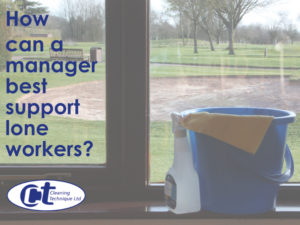How can a manager best support lone workers?
 This last year of pandemic has highlighted the need for employers to prioritise their employee’s safety and well-being in the workplace. As I write, the UK will join in marking World Safety and Health at Work Day on Wednesday 28th April. The Health & Safety Executive see this primarily as a time to promote occupational safety in the developing world (hse.gov.uk, 2021), but it is a good reminder of the importance of good Health & Safety (H&S) systems within businesses and organisations in the UK.
This last year of pandemic has highlighted the need for employers to prioritise their employee’s safety and well-being in the workplace. As I write, the UK will join in marking World Safety and Health at Work Day on Wednesday 28th April. The Health & Safety Executive see this primarily as a time to promote occupational safety in the developing world (hse.gov.uk, 2021), but it is a good reminder of the importance of good Health & Safety (H&S) systems within businesses and organisations in the UK.
How health and safety has changed
Our team are our greatest asset, delivering high quality cleaning to more than 85 clients. When Cleaning Technique started in the 1980s, H&S legislation and regulation was very different than it is today. But our ethos of seeing our team’s importance to our business has remained unchanged. We have always been mindful of our employees’ health, safety and well-being; the difference now is everything is documented to prove we comply with recommendations.
I oversee 70 cleaning operatives; some have been with us for over 15 years. We have robust measures in place to ensure their safety. Each new site undergoes a risk assessment. Where possible our operatives work within a team or have a buddy system. However, this is not possible at all sites and approximately 30% of our workforce are classed as lone workers; this can be seen as problematic.
If you have procedures in place to mitigate the risk, those working alone in your organisation can be reassured that their safety and well-being has been fully considered.
What external risks can a lone worker face?
-
A risk of violence or aggression from others.
-
Injury from trips or falls.
-
Accidentally lock-in.
-
Injury from an unsafe working environment.
What personal risks can a lone worker face?
-
Medical conditions can make the lone worker more susceptible to harm in that environment.
-
Lone workers are more susceptible to stress, due to the isolation of their role. (org, January 2021)
What procedures can help you manage lone workers?
-
Employers should have a dedicated lone worker policy that identifies the obligations of the management and the employee.
-
Complete a risk assessment to identify risks and strategies to minimise them.
-
Site specific training should be given at the commencement of their employment and updated accordingly.
-
Equipment should have passed safety checks.
-
Regular meetings should be scheduled to address any concerns the staff member may have.
How can a manager care for his lone workers?
We believe that managing a lone worker requires more than simply serving their practical and employment needs. As we have mentioned above, lone workers are far more susceptible to stress due to their isolation. After a year of multiple Lockdowns, we have all experienced how unnatural being cut off from other people feels. It’s right that as managers we also show care and compassion to those who are working hard for us in difficult environments.
So, in addition to all we have listed above, we believe it’s a good idea to keep in touch with our staff by phone or text. This offers reassurance they’re more than just a name to us. It can be tricky to manage a large team of cleaners when you want to develop a reassuring relationship; this is where technology can really support you. Using a variety of forms of communication, from texts to personal visits can really encourage your staff. Our staff also have our emergency contact numbers too in case they find themselves in difficult circumstances.
Lone worker alarms
 For certain sites and individual circumstances there will be a need for additional safety measures, such as a lone worker device, this is a discreet device worn on the belt or around the neck which can raise the alarm to a 24/7 monitoring centre. This device can pinpoint the workers GPS and even a ‘man down’ function, if a sudden illness or fall occurs.
For certain sites and individual circumstances there will be a need for additional safety measures, such as a lone worker device, this is a discreet device worn on the belt or around the neck which can raise the alarm to a 24/7 monitoring centre. This device can pinpoint the workers GPS and even a ‘man down’ function, if a sudden illness or fall occurs.
Our emphasis on making sure lone workers don’t feel isolated has meant our staff are happy to stay with us for years. Below, a cleaning operative called Jane, gives us her thoughts:
I’ve worked for Cleaning Technique for over 17 years now, it’s a great company to work for with friendly management and staff who are always accommodating if you have any queries, I couldn’t find a better company to work for!
In giving time to effectively manage the health safety and well-being of your team is the morally the right thing to do. But it also serves your company in the long run. You will find you have a happy, productive workforce and your business will operate more effectively, delivering a service to be proud of.
If you are interested in finding out about our routine contract cleaning service, please contact us for a free consultation.



